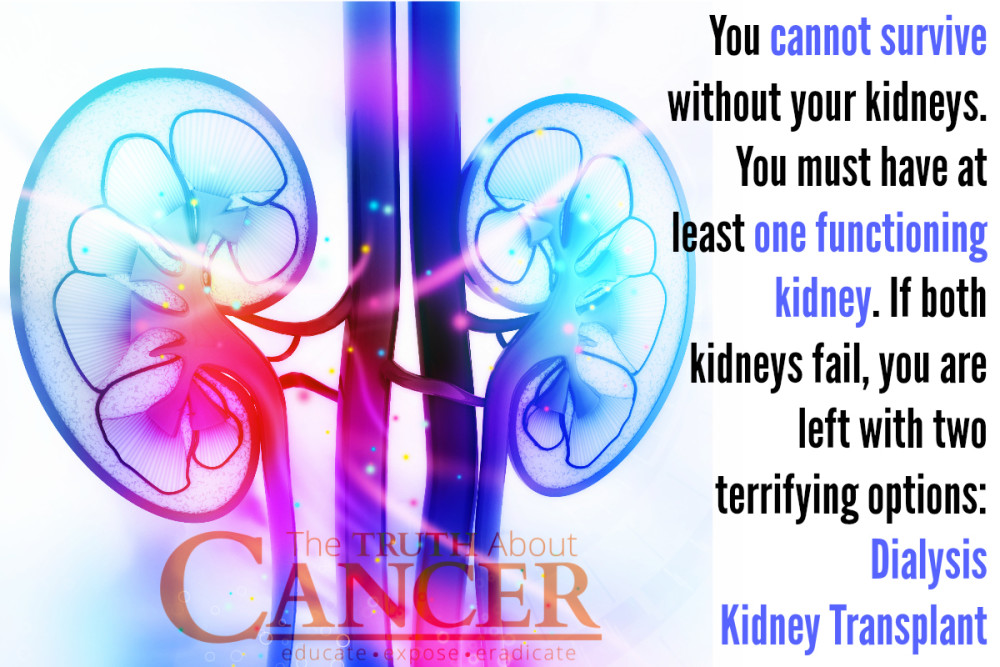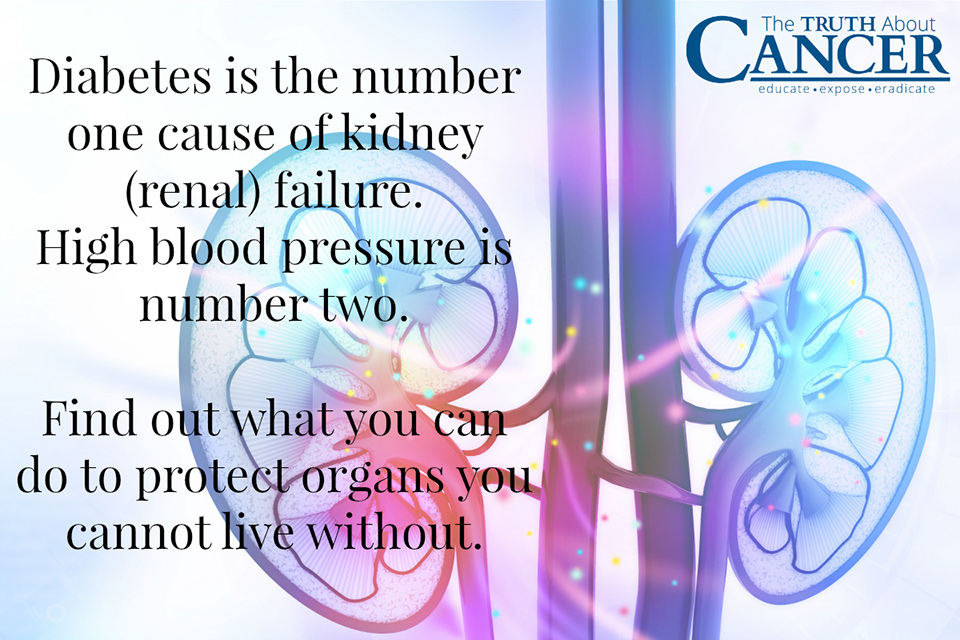9 Tips to Maintain Good Kidney Health
In
honor of World Kidney Day (Mar 10, 2016), we here at The Truth About
Cancer want to remind you of your precious kidneys… and to share some
helpful tips for maintaining good kidney health.
Kidneys are bean-shaped organs located in your lower back on either side of your spine. They release hormones that regulate blood pressure and stimulate red blood cell production. They also maintain fluid levels inside you, filter waste, aid in activating vitamin D, and balance your sodium, potassium, and phosphorous.
It takes about 30 minutes for your kidneys to filter every ounce of blood inside you. It might shock you to learn that kidney (renal) failure is officially the 9th leading cause of death in the U.S. Most people don’t give kidney health much thought − until these vital organs stop working.
If your kidneys fail, it means they’re unable to filter waste from your bloodstream. Within a matter of hours, the toxins inside you can build to a lethal level.
Kidney disease is a “silent” killer. Kidney function deterioration can happen quietly over time. But once your kidneys begin to fail, your health declines quickly. You might experience symptoms or you may have no clue you have kidney disease until you’re tested for an unrelated condition.


Research from Johns Hopkins University (published in American Journal of Kidney Disease) found that patients who are obese have double the risk of developing kidney disease. If you’re a smoker, you have 60 percent more chance of losing the use of your kidneys if they begin to fail.
This World Kidney Day take a moment to think about your personal kidney health. Figure out where the worst offenders are in your daily life and lower the toxins you pump through your body.
If you don’t protect these bean-shaped organs, they could literally collapse from exhaustion. Don’t wait until your kidneys fail before you recognize the importance of these under appreciated (and often ignored) organs.
Please take care of the health of your kidneys. You can’t live (long) without your kidneys… and you don’t want to try.
Kidneys are bean-shaped organs located in your lower back on either side of your spine. They release hormones that regulate blood pressure and stimulate red blood cell production. They also maintain fluid levels inside you, filter waste, aid in activating vitamin D, and balance your sodium, potassium, and phosphorous.
It takes about 30 minutes for your kidneys to filter every ounce of blood inside you. It might shock you to learn that kidney (renal) failure is officially the 9th leading cause of death in the U.S. Most people don’t give kidney health much thought − until these vital organs stop working.
If your kidneys fail, it means they’re unable to filter waste from your bloodstream. Within a matter of hours, the toxins inside you can build to a lethal level.
What Happens if Your Kidneys Fail?
You can’t survive without your kidneys. You must have at least one functioning kidney. If both kidneys fail, you are left with two options:- Dialysis − The only treatment for kidney failure is dialysis. Medical equipment takes over the filtration of your blood, doing the job your kidneys once performed. And it’s ongoing. Once you start dialysis due to renal failure, you’re in it for life. At this time, approximately 468,000 Americans are on long-term kidney dialysis.
- Kidney Transplant − The only other option is a kidney transplant, but demand far outweighs supply (it’s number one on transplant lists). As of 2016, more than 100,000 people in the U.S. alone are awaiting kidney transplants. Sadly, fewer than 17,000 will receive the life-saving organ they need in time.
Kidney disease is a “silent” killer. Kidney function deterioration can happen quietly over time. But once your kidneys begin to fail, your health declines quickly. You might experience symptoms or you may have no clue you have kidney disease until you’re tested for an unrelated condition.

10 Symptoms of Failing Kidney Health to Watch Out For
If you experience any of the following symptoms, seek medical attention immediately.- Less urine output or feeling as if you need to urinate more often
- Dark or pinkish urine, foam in urine
- Retaining fluids; swelling in limbs, abdomen, or face
- Seizure
- Increased sensation of thirst
- Chest pain or pressure
- Extreme fatigue, weakness, or unusual sleepiness
- Problems breathing
- Nausea
- Loss of cognition
What Raises Your Personal Risk of Kidney Failure?
- Diabetes (the leading cause of kidney failure)
- High blood pressure (the second leading cause of kidney failure)
- Poor lifestyle habits (smoking, substance abuse, excessive alcohol consumption)
- Obesity
- Chronic inflammation
- Compromised immune function, autoimmune disease, or persistent infections
- Inadequate nutrition
- Sudden blood loss (including surgical procedures)
- Blocks (such as kidney stones) that impair blood flow
- Long-term use of prescription or over-the-counter drugs
- Chronic dehydration
- Traumatic injury to kidneys
- Chemotherapy treatment, test dyes, and antibiotics
- Heavy metal toxicity
- Cancer

Research from Johns Hopkins University (published in American Journal of Kidney Disease) found that patients who are obese have double the risk of developing kidney disease. If you’re a smoker, you have 60 percent more chance of losing the use of your kidneys if they begin to fail.
9 Steps to Protect Your Kidney Health
- Control your blood sugar and check it regularly – 90% of all diabetes cases are type 2, which is 100 percent preventable and reversible
- Know your blood pressure – 20% of people with high blood pressure don’t know they have it because they exhibit no symptoms
- Exercise at least 20 minutes a day (even low impact exercise)
- Lose weight or maintain a healthy body weight
- Drink ½ ounce of water for each pound of bodyweight daily (eg. 150 lbs = 75 ounces of water daily)
- Avoid refined sugars and flours that induce rampant inflammation
- Eat organic when possible (fewer pesticides and additives that bio-accumulate)
- Quit smoking now
- Avoid use of OTC drugs and unnecessary prescriptions
This World Kidney Day take a moment to think about your personal kidney health. Figure out where the worst offenders are in your daily life and lower the toxins you pump through your body.
If you don’t protect these bean-shaped organs, they could literally collapse from exhaustion. Don’t wait until your kidneys fail before you recognize the importance of these under appreciated (and often ignored) organs.
Please take care of the health of your kidneys. You can’t live (long) without your kidneys… and you don’t want to try.
Article Summary
- Kidneys are bean-shaped organs located in your lower back on either side of your spine. They release hormones that regulate blood pressure and stimulate red blood cell production. They also maintain fluid levels, filter waste, aid in activating vitamin D, and balance your sodium, potassium, and phosphorous.
- You must have at least one functioning kidney. If both kidneys fail, you are left with two options: dialysis or kidney transplant. Transplant waiting lists are very long.
- Kidney
disease is known as a “silent” killer as kidney function deterioration
can happen quietly over time. Symptoms of kidney failure to watch out
for include:
- Less urine output or feeling as if you need to urinate more often
- Dark or pinkish urine, foam in urine
- Retaining fluids; swelling in limbs, abdomen, or face
- Seizure
- Increased sensation of thirst
- Chest pain or pressure
- Extreme fatigue, weakness, or unusual sleepiness
- Problems breathing
- Nausea
- Loss of cognition
- Diabetes and heart disease are two of the biggest causes of kidney failure. Other lifestyle causes include smoking, substance abuse, excessive alcohol consumption, and obesity.
- Here are 9 steps to reduce your risk of kidney failure and disease:
- Control your blood sugar and check it regularly
- Know your blood pressure
- Exercise at least 20 minutes a day
- Lose weight or maintain a healthy body weight
- Drink ½ ounce of water for each pound of bodyweight daily
- Avoid refined sugars and flours that induce rampant inflammation
- Eat organic when possible
- Quit smoking now
- Avoid use of OTC drugs and unnecessary prescriptions

No comments:
Post a Comment